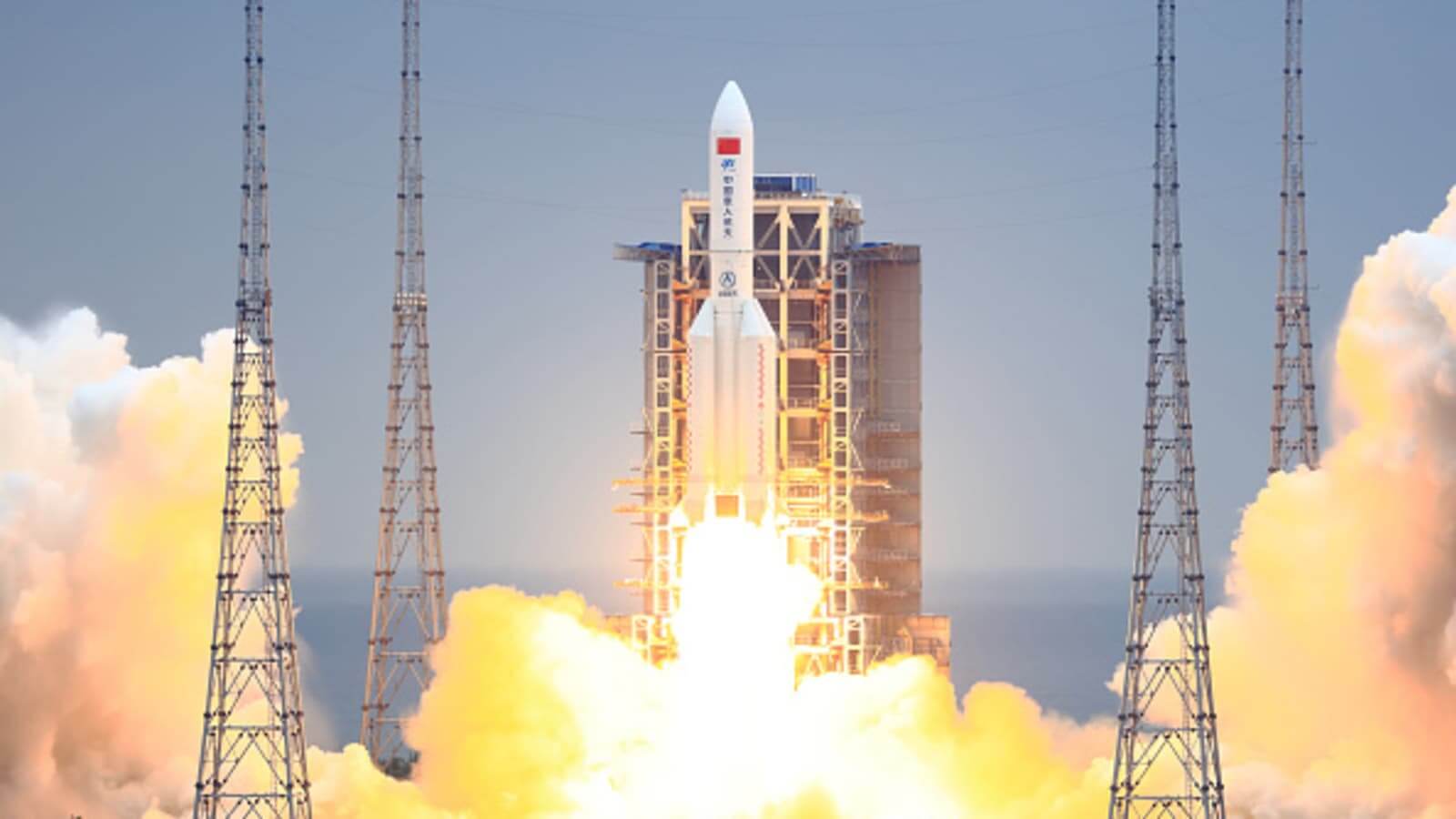Remnants from China’s Long March-5B Y2 carrier rocket made an uncontrolled reentry into Earth’s atmosphere, with most of it burning up on entry, while some remnants fell in the Arabian Sea, west of the Maldives. Officials in Beijing had previously said that there was little risk from the large freefalling segment of the space carrier.
The rocket was launched on April 29 from the Wenchang Space Launch Center in China’s southern Hainan province. It measured 98 feet long and 16.5 feet wide and weighed 21 metric tons. The mission of the launch was to carry into orbit a module containing living quarters for a future Chinese space station. However, upon completion of the task, the body of the rocket circled Earth in an uncontrolled manner and proceeded to reenter the lower atmosphere.
“After monitoring and analysis, at 10.24 am (0224 GMT) on May 9, 2021, the last-stage wreckage of the Long March 5B Yao-2 launch vehicle has re-entered the atmosphere,” the China Manned Space Engineering Office said in a statement. The agency also added that most of the segment disintegrated and was destroyed during re-entry.
Despite this, China has been on the receiving end of the backlash for the incident from several international space agencies, especially since the Long March rocket was massive—up to 18 tonnes—and was predicted to be unlikely to burn up entirely. The roughly 30-meter (100-foot) long rocket stage is among the biggest space debris to fall to Earth. Moreover, its uncontrolled return into Earth’s atmosphere also led to widespread public speculation and fear over the possibility of the rocket landing in an inhabited area.
“If the rocket is composed of materials that don’t separate on re-entry, it’s even riskier,” said Florent Delefie, an astronomer at the Paris-PSL Observatory. Nicolas Bobrinsky, head of engineering and innovation at the European Space Agency added that “The Chinese should have anticipated a controlled re-entry with a retrorocket, which is what the Russian did when they removed the Mir station from Earth orbit.” In addition, NASA Administrator Sen. Bill Nelson also issued a statement saying: “It is clear that China is failing to meet responsible standards regarding their space debris.” US Defence Secretary Lloyd Austin added that “spacefaring nations must minimise the risks to people and property on Earth.”
The rocket was launched on April 29 from the Wenchang Space Launch Center in China’s southern Hainan province. It measured 98 feet long and 16.5 feet wide and weighed 21 metric tons. The mission of the launch was to carry into orbit a module containing living quarters for a future Chinese space station. However, upon completion of the task, the body of the rocket circled Earth in an uncontrolled manner and proceeded to reenter the lower atmosphere.
“After monitoring and analysis, at 10.24 am (0224 GMT) on May 9, 2021, the last-stage wreckage of the Long March 5B Yao-2 launch vehicle has re-entered the atmosphere,” the China Manned Space Engineering Office said in a statement. The agency also added that most of the segment disintegrated and was destroyed during re-entry.
Despite this, China has been on the receiving end of the backlash for the incident from several international space agencies, especially since the Long March rocket was massive—up to 18 tonnes—and was predicted to be unlikely to burn up entirely. The roughly 30-meter (100-foot) long rocket stage is among the biggest space debris to fall to Earth. Moreover, its uncontrolled return into Earth’s atmosphere also led to widespread public speculation and fear over the possibility of the rocket landing in an inhabited area.
“If the rocket is composed of materials that don’t separate on re-entry, it’s even riskier,” said Florent Delefie, an astronomer at the Paris-PSL Observatory. Nicolas Bobrinsky, head of engineering and innovation at the European Space Agency added that “The Chinese should have anticipated a controlled re-entry with a retrorocket, which is what the Russian did when they removed the Mir station from Earth orbit.” In addition, NASA Administrator Sen. Bill Nelson also issued a statement saying: “It is clear that China is failing to meet responsible standards regarding their space debris.” US Defence Secretary Lloyd Austin added that “spacefaring nations must minimise the risks to people and property on Earth.”

